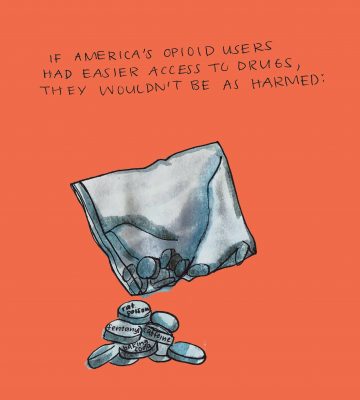The television series “Euphoria” depicts the hardships of drug abuse in a way that makes you wonder how drug use should be dealt with in America: should drugs be decriminalized, legalized or even both?

I would say yes to both legalization and decriminalization — either will be better than the current system of drug enforcement. Even very addictive and dangerous drugs such as heroin and fentanyl should be legalized and regulated.
We must first define the difference between decriminalization and legalization because the two are often used interchangeably, which is not always correct.

Decriminalization would mean less imprisonment for drug possession and less penalties for low-level drug sales. Legalization would absolve people of penalties for drug use and create safer access to these substances.
Many support decriminalization, but complete legalization of all drugs can sound extreme. But, I would argue that the legalization of drugs is the best step toward combating the opioid epidemic in the United States.
With legalization, drug users will face a less negative stigma and will receive the treatment they need. While there may be more access to drugs, the substances would come from safer sources. Heroin’s ingredients often include rat poison, laundry detergent and baking soda — none of these should be in your body.
Substantial downsides do come with legalization, one being the possible increase in addiction rates. Drug prices would also be increased as a way to curb their purchase, which could unfortunately enforce the already dangerous black market.
Though drug prices may have to be increased for a brief amount of time while the laws are being implemented, they would not have to say that high for very long. Once a support system is built for addicts and drug users, drug prices should lower to a rate competitive with the black market.
Access to drugs is not necessarily a terrible thing, because this enables governments to better regulate them, in turn helping to prevent overdose.
Varying levels of government will also earn increased revenue from legal drug sales, and could reallocate money budgeted for law enforcement agencies that have no further need to police drug-related crimes.
But in order to counter this, there would have to be an increase in drug treatment centers. No societal issue is simple enough to solve with only one solution.
We must put in the time, energy and money to help those who are struggling with drug addiction instead of leaving them to eventually die of an overdose. That is why decriminalization is so important in rehabilitating those who have substance abuse problems.
In 2001, Portugal was the first country in the world to decriminalize all drug use. Previously, Portugal — in a situation similar to that in the United States — had suffered a serious drug addiction problem and met it by imposing harsh criminal penalties.
Since decriminalization, however, Portugal has created centers for addicts that provide treatment and prepare them for their return to society. Social workers even provide clean needles to users on the street, which has prevented the spread of diseases such as HIV and hepatitis C.
Legalization is the future of drug use in the United States, and decriminalization is only one step toward getting there. If drugs are solely decriminalized, then that will only address the number of people imprisoned for drug-related offenses — not the fact that people are still shooting baby powder into their veins.
Drug addiction is not something that is going away. Instead of imprisoning people for their addiction, we can start addressing the problem by de-stigmatizing it and focusing on building treatment centers to help those who are suffering.
Everyone deserves a second chance at life, and it is immoral to reduce the value of their existence down to their drug dependency. By creating more systems and resources for those who struggle with drug addiction, we can provide them with the resources they need to recover.























































































































